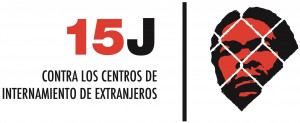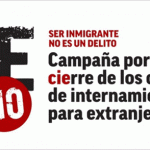
Spanish NGOs across the country have dedicated June the 15ª to actively campaigning for the closure of Internment Centers for Foreigners (CIEs). CIEs are prisons in all but name for foreigners who find themselves in an irregular administrative situation. Pro Igual has written about CIEs in the past and some of our advocacy activities are also related to human rights violations taking places in CIEs.
CIEs exist against a backdrop of the economic crisis and rise in xenophobia exploited by some political forces to gain votes. But declarations demonizing immigrants are not only harmful for social cohesion, they are also patently untrue. Here are 5 persistent myths v. facts regarding immigration in Spain.
Myth 1: Immigrants are “flooding” Spain.
Fact: For several years now Spain has experienced net out-migration, that is, more people leave than come to Spain. According to the figures of the Spanish Institute for Statistics (INE), not only Spanish citizens leave Spain in droves, but also more foreign (non-EU) nationals leave than come.
Myth 2: Immigrants are responsible for most crime in Spain.
Fact: Neither in terms of economic volume (that is, how much money they got through criminal activity), nor in terms of violence, do foreigners lead. In several major corruption cases uncovered in recent years and involving billions of euros, it was Spanish citizens, often holding public office, who were the perpetrators, not immigrants.
Myth 3: Immigrants burden Spanish social security.
Fact: Budget cuts of recent years have left without access to healthcare tens of thousands of immigrants who lost jobs and access to residence. That is despite the fact that immigrants were contributing to economy and social security while they had jobs. At the same time, troubled companies, primarily banks, received billions of public funding after causing economic damage to the country that affected all the rest. Sheer amounts of subsidies to banks dwarf all the (theoretical) welfare payments to Spaniards and immigrants combined.
Myth 4: Foreigners in CIEs are criminals and subject to deportation.
Fact: Less than a quarter of CIE detainees are charged with any infraction. Well over half are released following identification, after having suffered the trauma of de facto imprisonment and on occasion even abuse. There is no need to maintain these expensive and inhuman institutions to address the issues that present less danger to public than traffic violations.
Myth 5: CIEs are “residential centers” for foreigners.
Fact: CIE inmates are often subjected to human rights violations, prompting a nickname “Spanish guantanamos.” Just recently, la Spanish courts ruled against CIE guards accused of rape, beating and other forms of ill-treatment of inmates. And since inmates cannot leave, or for that matter be visited by family at their leisure, CIEs are effectively prisons. The only difference is: there needs to be a crime and a due process in order to throw a person in jail. To get into CIE, it is sufficient to “look foreign” and not have an ID.
Tan, today, Pro Igual joins with our friends and colleagues from other Spanish NGOs in calling for the immediate and complete closure of CIEs.


 marzo 3rd, 2022
marzo 3rd, 2022 









